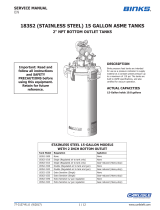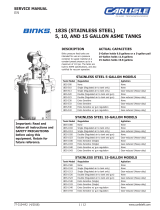Page is loading ...

WARNING: NO PORTION OF THIS MANUAL MAY BE REPRODUCED IN ANY SHAPE
OR FORM WITHOUT THE WRITTEN APPROVAL OF GRIZZLY INDUSTRIAL, INC.
MODEL H6329
2
1
⁄2 GALLON PAINT TANK
INSTRUCTION MANUAL

This manual provides critical safety instructions on the proper setup,
operation, maintenance, and service of this machine/tool. Save this
document, refer to it often, and use it to instruct other operators.
Failure to read, understand and follow the instructions in this manual
may result in fire or serious personal injury—including amputation,
electrocution, or death.
The owner of this machine/tool is solely responsible for its safe use.
This responsibility includes but is not limited to proper installation in
a safe environment, personnel training and usage authorization,
proper inspection and maintenance, manual availability and compre-
hension, application of safety devices, cutting/sanding/grinding tool
integrity, and the usage of personal protective equipment.
The manufacturer will not be held liable for injury or property damage
from negligence, improper training, machine modifications or misuse.
Some dust created by power sanding, sawing, grinding, drilling, and
other construction activities contains chemicals known to the State
of California to cause cancer, birth defects or other reproductive
harm. Some examples of these chemicals are:
• Lead from lead-based paints.
• Crystalline silica from bricks, cement and other masonry products.
• Arsenic and chromium from chemically-treated lumber.
Your risk from these exposures varies, depending on how often you
do this type of work. To reduce your exposure to these chemicals:
Work in a well ventilated area, and work with approved safety equip-
ment, such as those dust masks that are specially designed to filter
out microscopic particles.

Safety Instructions for Pneumatic Tools
1. READ THIS MANUAL.
2. WEAR EYE PROTECTION.
3. WEAR A RESPIRATOR.
For Your Own Safety Read Instruction Manual
Before Operating This Equipment
The purpose of safety symbols is to attract your attention to possible hazardous
conditions. This manual uses a series of symbols and signal words which
are intended to convey the level of importance of the safety messages. The
progression of symbols is described below. Remember that safety messages by
themselves do not eliminate danger and are not a substitute for proper accident
prevention measures.
Indicates a potentially hazardous situation which, if
not avoided, MAY result in minor or moderate injury.
It may also be used to alert against unsafe practices.
Indicates a potentially hazardous situation which, if
not avoided, COULD result in death or serious injury.
Indicates an imminently hazardous situation which,
if not avoided, WILL result in death or serious injury.
This symbol is used to alert the user to useful
information about proper operation of the equipment.
SAFETY
NOTICE
4. WEAR HEARING PROTECTION.
5. MAINTAIN SAFETY GUARDS.
6. KEEP CHILDREN AWAY.

7. AVOID ENTANGLEMENTS.
8. USE CORRECT AIR PRESSURE.
9. DISCONNECT AIR PRESSURE
10. SECURE TOOLING.
11. SHARP SURFACES.
12. REMOVE ADJUSTING KEYS AND
WRENCHES AFTER USE.
13. AVOID FLAMMABLES
14. SECURE WORK.
15. MAINTAIN TOOLS WITH CARE.
16. DO NOT FORCE TOOL.
17. CHECK FOR DAMAGED PARTS
BEFORE USING.
18. USE GOOD LIGHTING.
19. AVOID UNINTENTIONAL OPERA-
TION.
20. USE THE RECOMMENDED
ACCESSORIES.
21. NEVER ALLOW UNTRAINED
USERS TO USE THIS TOOL WHILE
UNSUPERVISED.
22. IF YOU ARE UNSURE OF THE
INTENDED OPERATION, STOP
USING TOOL.
23. BE AWARE OF HOSE LOCATION.
24. DO NOT USE UNDER THE
INFLUENCE OF DRUGS OR
ALCOHOL, OR WHEN TIRED.
Safety Instructions for Pneumatic Tools

No list of safety guidelines is complete, because every work environment is
different. Always consider safety first and use common sense. Failure to use this
tool with caution and respect could result in serious personal injury.
1. READ THIS MANUAL.
2. DESIGN MODIFICATIONS.
3. CLEANING AND MAINTENANCE.
4 REACTIVE CHEMICALS.
5. SAFETY VALVE MODIFICATIONS.
Additional Safety Instructions for Paint Tanks
6. REMOVING LID.
7. LID CLAMPS.
8. NON-STANDARD COMPONENTS.
9. ATTACHMENTS.

INTRODUCTION
Specifications
Foreword
Paint Tank

H6329 Inventory (Figure 1) ............... Qty
A.
B.
C.
D.
E.
Inventory
SETUP
immedi-
ately call Customer Service at (570) 546-
9663for advice.
Otherwise, filing a freight claim
can be difficult.
Unpacking
Figure 1.

Tank Assembly
To assemble the paint tank:
1.
2.
Figure 3
5.
Figure 4
Figure 2.
3.
Figure 3
4.
Figure
3
Figure 3.
Figure 4.

OPERATIONS
Note: The pressures suggested for the
gun types listed below are typical operating
guidelines:
Internal Mix Guns:
External Mix Guns:
Tank Regulator and
Spray Guns
Do not exceed the 45 PSI maximum
operating pressure on your paint tank.
Exceeding the maximum pressure may
cause the tank to explode, causing
serious personal injury.
EXPLOSION HAZARD! DO NOT
smoke or have any source of flame
or spark near spraying. Vapors will
explode if ignited.
RESPIRATORY HAZARD! Alw ays u se
a NIOSH approved respirator when
using spray equipment. Failure to
protect your lungs can lead to respi-
ratory illness and nervous system
damage. Spraying some paints and
varnishes may require a supplied air
respirator system.
TOXIC FUMES! Always use an
approved spray booth or well ven-
tilated area when spraying. NEVER
spray in a confined space where
toxic fumes and flammable vapors
can accumulate to deadly levels.

Read the manual before operation.
Become familiar with this tool, its
safety instructions, and its operation
before beginning any work. Serious
personal injury may result if safety
or operational information is not
understood or followed.
To use the paint tank:
1. Figure 6
Figure 5
2.
3.
4.
Figure 4
5.
6.
7.
8.
Not designed for use with highly
abrasive, corrosive, or rust inducing
materials. Also avoid using lacquer
in the tank, as it will ruin the Teflon
coating.
NOTICE
Figure 5.
Air
Compressor
Gun air supply
ON/OFF valve.
Gun regulator setting
as specified by gun
manufacturer. Typically
never exceed 60 PSI Max.
Paint supply
ON/OFF
valve
Water
separator.
120 PSI Max.
120 PSI Max.
10 to 45 PSI Max.
Tank regulator
setting is typically
10 PSI. NEVER
exceed 45 PSI Max.
120 PSI Max.
Tank air
supply
ON/OFF
valve.
EXPLOSION HAZARD!
Never exceed 45 PSI when pres-
surizing the tank.
Operation

CLEANING AND LUBRICATION
3.
4.
5.
Note: Check with local laws regarding
this practice. Spraying solvents into
the air may be illegal in your area. A
cabinet style spray gun cleaner may be
required.
6.
7.
To clean the paint tank:
1.
EXPLOSION HAZARD! Removing the
lid while the tank is pressurized could
result in lid being thrown violently
from tank, causing serious personal
injury. Always shut off air pressure
at source and bleed off all pressure
in tank before removing lid.
2. Figure 6
Figure 6
Cleaning the Tank
Figure 6.

Tank Troubleshooting
Symptom Possible Cause Solution
OFF
ON

Troubleshooting
Symptom Possible Cause Solution

Symptom Possible Cause Solution

H6329 PAINT TANK
REF PART # DESCRIPTION REF PART # DESCRIPTION
1 PH6329001 HANDLE 20 PH6329020 MIXING PROPELLER
2 PH6329002 LID GASKET 21 PB06M HEX BOLT M8-1.25 X 12
3 PH6329003 COMPLETE LID ASSEMBLY 22 PH6329022 PIN
4 PH6329004 TANK 23 PH6329023 E-CLIP 8.5MM
5 PN03M HEX NUT M8-1.25 24 PH6329024 LOCK STUD
6 PLW04M LOCK WASHER 8MM 25 PH6329025 SEALING WASHER
7 PH6329007 SWIVEL CASTER 26 PW14 FLAT WASHER 5/8
8 PH6329008 AIR INLET CONNECTION 27 PB07M HEX BOLT M8-1.25 X 25
9 PH6329009 AIR DEFLECTOR 28 PH6329028 SHOULDERED BOLT
10 PH6329010 FLUID OUTLET BODY 29 PH6329029 CRANK HANDLE
11 PH6329011 STAND PIPE 30 PH6329030 COMPLETE CRANK ASSEMBLY
12 PH6329012 FILTER BODY 31 PB02M HEX BOLT M6-1 X 12
13 PH6329013 FILTER WASHER 32 PH6329032 PROPELLER SHAFT
14 PH6329014 FILTER SCREEN 33 PH6329033 COLLAR
15 PH6329015 SCREEN RETAINER 34 PH6329034 SEALING WASHER
16 PH6329016 PAINT OUTLET VALVE 35 PORP016 O-RING 15.8 X 2.4 P16
17 PH6329017 AIR REGULATOR 36 PH6329036 SHAFT HOUSING
17-1 PH6329017-1 AIR REGULATOR HOUSING 37 PW01M FLAT WASHER 8MM
17-2 PH6329017-2 PRESSURE GAUGE 180PSI 38 PH6329038 WING NUT
18 PH6329018 PRESSURE RELIEF VALVE 39 PH6329039 MACHINE ID LABEL
19 PH6329019 AIR VENT VALVE
15
34
35
36
33
21
32
31
30
29
28
5
27
5
26
24
22,23
21
20
18
19
17-1
17-2
17
25
14
13
12
11
10
9
8
7
5,6,37
4
3
38
1
16
38
2
39

/


